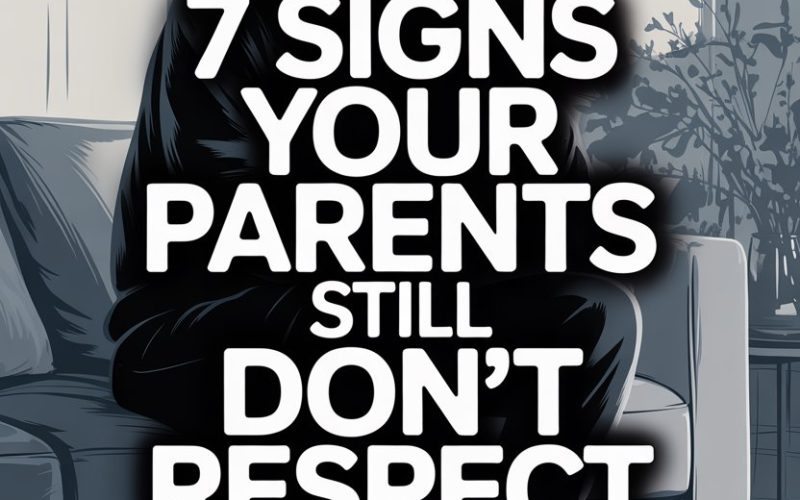Every adult child eventually faces one of life’s great ironies: you can buy your own groceries, keep a human alive, and file taxes, but certain parents will still see you as someone who shouldn’t operate the toaster unsupervised.
In the whirlwind of raising your own kids, you might catch yourself wondering if you and your parents are ever truly on the same page—or even reading the same book.
If you sometimes feel like you’re starring in the world’s longest-running production of “Because I Said So,” you’re not alone.
Here are seven signs your parents might still be treating you like the backup dancer in your own life, along with some practical ways to change the choreography.
1. They Ignore Your Boundaries
It starts innocently enough.
Your mum pops round unannounced, “just to see the grandkids.” Your dad insists on popping his head into your home office during work calls—again. You say “no,” and suddenly you’re branded as ungrateful.
When parents breeze past your requests or dismiss your limits, it’s not just a quirk. It signals they’re not taking your autonomy seriously (yes, even if you’re wearing slippers shaped like giraffes).
Healthy respect means knocking before entering, accepting when you need private time, and not treating your fridge as a free-for-all snack zone. Family therapists agree: boundaries protect relationships.
What works? Calm repetition. Kindly but firmly restate your needs, every single time. “We’d love to see you, but please call first.” If you cave even once, they’ll see it as an invitation.
Consistency is your friend here—the more you stick to your guns, the sooner they’ll get the message.
2. They Undermine Your Parenting Decisions
You say “no sweets before dinner.” Your parents say, “But it’s just a little chocolate, darling!” in a decibel range only dogs and toddlers can hear.
They question your discipline, second-guess your routines, and sometimes hand your child a triple espresso just to prove a point (or so it seems).
This isn’t just annoying; it chips away at your authority in your own home. Parenting experts have found that consistent undermining by grandparents leads to confusion and frustration for everyone—including your little ones.
Kids thrive on predictable rules, and when those rules shift with every grandparent visit, chaos follows.
It’s time for the “my house, my rules” talk. Explain your reasoning, but don’t over-justify. Request their support in front of the kids, even if they disagree in private.
And if a sneaky sweet makes its way in, don’t lose your cool—correct course and keep your boundaries in place.
3. They Minimize Your Accomplishments
You land a promotion, manage a meltdown-free family holiday, or even complete a full week of packed lunches without resorting to questionable leftovers.
You’re expecting high-fives; instead, you get, “Well, I used to do that with three kids and no dishwasher.”
If your achievements always seem to shrink in the retelling, you’re probably dealing with a classic case of minimization. This habit can leave you feeling like nothing is ever quite good enough—no matter the milestone.
Self-celebration matters. Gather your own cheer squad, whether it’s your partner, mates, or a WhatsApp group who know how to throw a virtual confetti parade.
If you want your parents to join in, spell it out: “This was a big deal for me. I’d love to celebrate together.” Sometimes, people need instructions—subtlety can be lost on folks who still call you by your childhood nickname.
4. They Make Big Decisions Without You
You come home to find the living room rearranged, or your parents announce they’ve signed your child up for piano lessons “because it’s good for them.” Never mind if you already had ballet, swimming, and sleep penciled in.
Cutting you out of major (or even minor) decisions hints that your opinions don’t carry much weight.
The American Psychological Association notes that respecting grown children’s decision-making is a key part of healthy family dynamics.
Shift the power balance by calmly outlining how these choices affect you and your family. Say, “We appreciate your help, but decisions about our home/children need to come from us. If you have ideas, let’s talk first.”
Encourage involvement that’s collaborative, not commandeering.
5. They Dismiss Your Feelings
You share that you’re stressed, exhausted, or just plain overwhelmed. Cue the chorus: “You think you have it tough? Wait until you’re our age!” Or perhaps a gentle, “You’re too sensitive, love. Relax.”
Dismissing your emotions is a not-so-subtle way of saying your experiences don’t matter. Research shows that emotional invalidation, even with good intentions, damages trust and connection over time.
Try responding by naming what you need: “I’m just looking for someone to listen, not fix it.” Or, “It helps me feel supported when my feelings are acknowledged.”
If this gets eye rolls, that’s okay; you’ve made your point—and modelled empathy for the next generation.
6. They Rely on Guilt and Obligation
Every visit, phone call, or family gathering comes with a side of guilt trifle. “We never see you anymore.” “Your sister calls twice a week.” “We’re not getting any younger, you know.”
Guilt trips can make you feel responsible for your parents’ happiness, as if your sole purpose is to keep their spirits high.
This isn’t respect—it’s emotional arm-twisting. Experts in family dynamics say guilt undermines healthy adult relationships.
Break the cycle with clear but loving communication. “I want to spend time together, but my schedule is packed. Let’s plan ahead.” Offer specific dates instead of vague promises.
Guilt only works if you buy into it; boundaries and honesty are your best defense.
7. They Treat You Like a Child in Front of Others
You’re at a family braai, and your mum announces, “Jenny still can’t cook to save her life!” Or your dad insists on recounting the story of how you once tried to microwave an egg (it exploded, but it was 1997, and you were curious).
Being the punchline in front of others—especially your own kids—undermines your authority and confidence. It keeps you stuck in the role of “child,” no matter how many grey hairs you’ve collected.
Speak up with humour and grace: “Careful, mum, or I’ll start telling stories about your driving.” Or pull them aside and explain how those comments land.
Setting boundaries here helps everyone see the family in a new, more respectful light.
Moving Forward with Self-Respect
It’s one thing to recognize these signs—quite another to address them in real life, especially when you’ve got laundry multiplying and a toddler painting the dog.
Parental respect isn’t just about politeness; it’s about building the kind of family culture you want for your own children.
Change is rarely instant, especially with family. But with gentle persistence, clear boundaries, and the occasional well-timed joke, you can reset old patterns.
Your parents may never see you as an equal in every way. That’s alright.
You’re not looking for permission—you’re claiming your seat at the grown-ups’ table, slippers and all.




